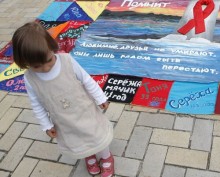Activists began collecting signatures for the petition titled “Save charity! Sign the petition to the parliament demanding not to put the bill No. 3100 on the agenda.” Copies of the petition have already been sent to the head of the Parliamentary Committee on Culture Viacheslav Kyrylenko, Prime Minister Mykola Azarov, and the President of Ukraine Viktor Yanukovych. Currently, over 1,500 people have already signed it.
The thing is that on the initiative of Mykola Azarov and the Cabinet of Ministers of Ukraine – the authors of the document “On Amending the Law of Ukraine ‘On Charity and Charitable Organizations’” mandatory notarization of contracts for charitable donations of the amount that exceeds 50 non-taxable minimum income – 850 hryvnias will be introduced in Ukraine. Thus, for example, the state tax on a donation of 1,500 hryvnias will be 17 hryvnias and the notary fee will be 150-200 hryvnias. The Ministry of Justice explained: “The main purpose of the bill is the improvement of the legal regulation of charitable activities.”
Philanthropists are not just concerned about such “improvements,” the predict that if the bill is passed, not only the total number of the donations will be reduced, but it will also become impossible to receive a donation from non-residents of Ukraine, to use credit cards and other electronic communication as modern and transparent means of attracting donations, corruption risks of costs for notary service will increase without improving the quality and effectiveness of charity assistance.
“In the beginning of summer a meeting of the Coordination Council under the president of Ukraine was held in Ukraine. The meeting brought together representatives of the government, ministries, and NGOs,” said Anna HULEVSKA-CHERNYSH, director of the Ukrainian Philanthropists Forum. “We talked about the need for changes to the law on charity. We agreed to form a working group. This happened on June 4 and by June 12 the Ministry of Justice prepared their own changes. The first proposed change was that a written agreement must be signed and certified by a notary if a donation of more than 850 hryvnias is made.”
Maksym LATSYBA, coordinator of the Civil Society Development Program at the Independent Political Research Center, refers to Article 22 of the Constitution of Ukraine: “New laws cannot impair the rights and freedoms that are guaranteed by the laws in force.” He continued: “But this law violates this article. We were shocked by the amendment introducing the notarization. This means that a notary, in fact, will identify a person, who makes a donation, and those, who will receive it, by their passports. If some Mr. Stetsenko gave Mr. Petrenko 1,000 hryvnias for medical treatment, why does the state need to know about that? These are civil relations between two individuals and the state should not control this. But then it will be under control of the Ministry of Justice. Notaries are their flock. They had to throw a bone, give notaries a chance to make some money. And philanthropists are the best target for stripping some money. But it has already been recorded in the law on charity that charitable donations are not subject to mandatory notarization. We have to protect this norm.”
Another proposed change deals with getting property and land for use for free. “The authors of the bill offered to remove the phrase ‘subject to use for charity.’ This means that charities will be able to use them not only for charitable purposes, thus, such property or land can become a part of corruption schemes of the interested individuals,” added Hulevska-Chernysh.
“This bill is also designed to prohibit the establishment of ‘Nobel Foundation’ – a charitable organization established under person’s will, in Ukraine because it is suggested that the respective part of Article 13 should be removed,” said Latsyba.
Until now all appeals to the state officials from the public remained ignored – on August 16 this bill was registered in the Ukrainian parliament. It, by the way, puts an end to online charity. For example, recently the founder of the Internet project “Tabletochki” Olha KUDINENKO calculated how many donations made to her project exceeded the amount of 850 hryvnias – ten percent. “But it is 82 percent of the total amount of all donations made – 1,929,623 hryvnias from the total of 2.4 billion collected. Given this fact it is clear that such initiatives can kill all our activities,” said Kudinenko. If the project “Tabletochki” had not received this money, the volunteers would have not been able to buy the necessary medical equipment and drugs. And this means that 80 percent of sick children would have not received help. “If such law was in force before, instead of 200 children who received a chance to get well, only four would get it, because that’s the number of children the state sent abroad for treatment,” continued Kudinenko.
And this is an example of only one charity project. If these figures would be applied to all charities that deal with sick people, orphans, and pensioners, one can only imagine how many people will not receive charitable assistance… In five years of the work of the Board of Trustees of OKHMATDYT it collected 60 million hryvnias. The new law, in fact, would deprive children with cancer of 48 million from that. In five years they have sent 61 children abroad to get bone marrow transplantation. Forty nine of these children could have not received such assistance otherwise.
“Our country does not provide social assistance to those who need it and also, in fact, forbids people to help each other,” summed up the initiator of the project “Tabletochki” Olha Kudinenko.







